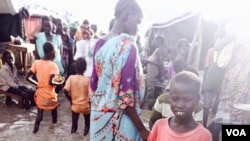Peace talks between warring parties in South Sudan have been delayed, once again, as the humanitarian crisis in the country continues to deepen. Frustration is growing as rival sides make scant progress on a deal, and the threat of further violence looms large.
Negotiations that were set to resume Thursday between the South Sudanese government and rebel factions have been postponed until at least October 20, in the latest delay to the slow-moving talks.
The biggest obstacle at the moment is failure to agree on the shape of a planned transitional government and the distribution of power therein.
Past agreements, including three separate cease-fire deals, have failed to take hold.
Violence that began in December last year has displaced more than one million people in the country. Without peace, many are too afraid to return.
Nhial Tiitmamer, policy analyst at the Sudd Institute in South Sudan, says the country is starting to lose its patience.
“People are really suffering in the displaced camps and also people are also suffering in the refugee camps, people want to go back home," Tiitmamer said. "That's why people are getting frustrated.”
At the heart of the conflict is a political dispute between President Salva Kiir and his former deputy Riek Machar. The split has divided factions of the military and led to inter-ethnic fighting that has killed at least 10,000 people.
While the country has been relatively calm since the rainy season began around May, security and humanitarian officials warn fighting could resume in the coming dry season, putting more pressure on already vulnerable populations caught in the crossfire.
Aid agencies warned last week more than one million people could be pushed into extreme hunger by early next year if the situation does not improve.
In order for there to be peace, Tiitmamer says the warring sides have to first work through their political differences.
“If the politicians can agree it would follow that their followers will also stop the fighting," Tiitmamer said. "So this has not happened so far, although the cease-fires were signed, there was no agreement on the political issues.”
The international community has also been increasing pressure on political leaders.
The United States has already imposed sanctions against South Sudanese officials accused of fueling the crisis, and is considering further restrictions.




